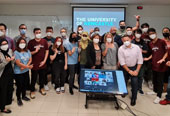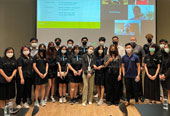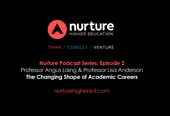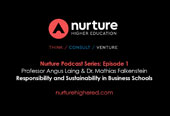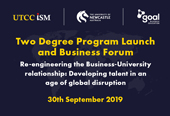Teaching & Learning:
Perspectives on the Business of Business Schools – Part 1


DATE
17/05/2019
AUTHOR
Angus Laing, Co-Founder & Chairman Nurture Higher Education Group
Perspective matters. Perspective shapes perceptions. Perspective shapes priorities. It shapes our view of the world we inhabit and what we consider appropriate courses of action to pursue. Differing perspectives can result in misunderstanding, even mutual incomprehension.
Imagine the perspectives of two tourists visiting the same location. The tourist taking the walking trail can see the detail of the flora and fauna surrounding them, they can feel the texture of the soil, they can hear the sound of running water. But they cannot see over the trees, they cannot see beyond the ridge adjacent to the trail. By contrast the tourist taking the helicopter tour can see over the trees, they can see beyond the ridge, yet they cannot feel the soil, hear the water, see the detail of the flora and fauna.
Now imagine the respective perspectives of the academic in the classroom, and the Dean (to be entirely clichéd) in the office. The academic understands the nature of the students in the class, can feel their engagement (or not) with the material, is focused on developing the student’s disciplinary knowledge, is concerned at a personal level with student satisfaction. It is a fine-grained perspective which is focused on the individualised encounter of the academics with identifiable students. The Dean by contrast is conscious of overall levels of student demand, of the expectations of value and outcomes of students, is concerned with league table rankings. It is course-grained perspective, which is focused on the collective encounter of anonymised students with the School.
Both are in the same “location”, they both are concerned with student learning and the delivery of teaching, but their perspectives are very different. In turn their obsessions are very different. While the increasingly ready accessibility of large amounts of student data enables both the academic and the Dean to an increasing degree to “see over the ridge” and “see the detail of the flora” respectively, the experiential perspective is very different. For the academic it is in the classroom, it is with disciplinary peers. For the Dean it in spreadsheets, it is with the Provost. Their respective obsessions reflect these experiences.
Yet Deans’ invariably have been the academic in the classroom at an earlier point in their career. That early classroom experience, that nostalgic recollection of “walking the trail”, remains an influence on their thinking even though they are now “in the helicopter”. It contributes to the way in which they interpret evidence, the inferences they draw, even though the pace of change may make such formative experience redundant. The potential danger of the Dean’s “when I was teaching …” reflection cannot be underestimated, the climate has changed, the soil will feel different, the river may be dry.
Shuttling between these perspectives and coping with the obsessions of each party (as well as potentially the redundant experience of the Dean) is the Associate Dean with responsibility for teaching along with the cadre of Programme Directors. Their sense making of the twin perspectives is critical in shaping the learning and teaching agendas in business schools. Their challenge is to mesh the experiential reality of frontline academic colleagues with the potentially very different experiential reality of the Dean. Into this the Associate Dean brings their own particular expertise and experiences, in particular adding a wider cross-university perspective into the mix.
So, what then are the main strands of that reality for the Dean, what is real when looking at the teaching and learning landscape from the (dis)advantage point of the helicopter? What then are the obsessions that stalk Deans waking hours? Inevitably such a list of obsessions reflects personal experience of leading two business schools in the United Kingdom. However, from the privileged position of observing business schools across multiple jurisdictions through both accreditation panels and the development of Nurture HE initiatives, one is struck by the commonality of the core themes and issues. It is somewhat like watching a play with which you are familiar, say Macbeth, the stage set, the actors, the director may all be different, but the plot line remains fundamentally constant irrespective of where the play is being staged.
Acknowledging this particular experiential base, any compilation of top obsessions of Deans with teaching and learning would almost certainly encompass the following:
- Student demand
- Policy and regulation
- League tables and rankings
- Student satisfaction
- Graduate outcomes
- Accreditation
- Efficiency
- Innovation Space and facilities
Although this is by no means either an exhaustive list (“how long have you got?”) or an authoritative one (“it’s his rather peculiar view of the world”), running this past fellow deans brings painful nods, rueful agreement about our obsessions and a sense that we inhabit a world that is both very detached from that of our frontline colleagues but at the same time ultimately focused on the same core objectives.
Over the next few weeks we are going to be delving into each of these obsessions and reflecting on what they mean for deans, and indeed colleagues across business schools for whom such obsessions inevitably feel remote and potentially disconnected from their experience of reality. For Nurture HE these issues lie at the very heart of our commitment to developing and delivering high quality affordable business education globally. Our focus is on delivering status, real returns and participation in a global community through the Goal Business Education proposition. This proposition is underpinned by delivering outstanding graduate outcomes and exceptional student satisfaction while supporting our delivery partners on the journey towards accreditation.
SHARE THIS ARTICLE ON

